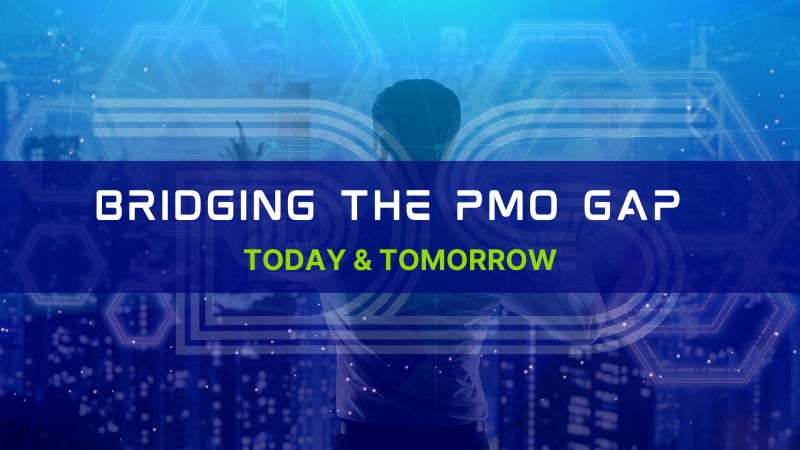
by DharamCW | Oct 10, 2022 | General
A Project Management Office (PMO) is a group or department within an organization that defines and maintains project management standards. It provides project management guidelines and standards. In addition, it aids in developing measurable objectives that align with the organization’s overall vision and ensure that all targets are met. PMO will also be referred to as a program or project portfolio management office, depending on the project/program/portfolio.
The Project/Program/Portfolio office has undergone a paradigm shift during this COVID-19. This shift has also paved the way for innovative ways of its operations and leads us to the question of revisiting gaps PMOs have from the context between where we are today and how the future holds for the PMO. Project managers/portfolio managers need to embrace today’s PMO situation and be ready for transformation in the days ahead. There could be challenges and opportunities that need prioritizing. This article helps to envisage the gaps between PMOs of today and PMOs of the future.
PMO Types
PMOs are based on their degree of control and influence on projects. Of the many types, there are three distinct types of PMO.
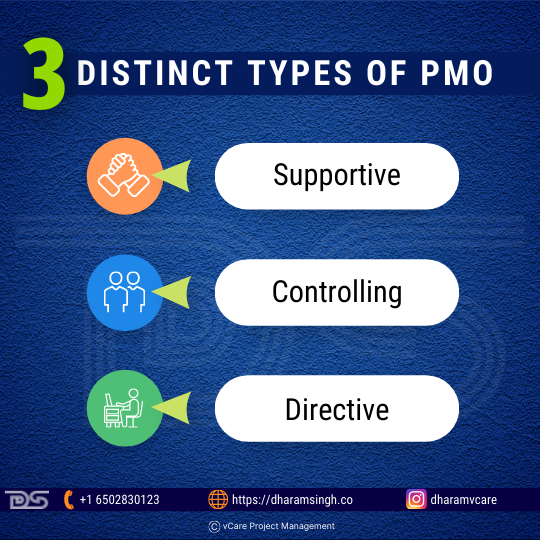
3 Distinct Types of PMO
- Supportive: A supportive PMO gathers all of an organization’s projects and provides best practices, templates, and training but with limited control.
- Controlling: A controlling PMO ensures that project management tools, processes, and standards are implemented in a controlled manner.
- Directive: Within the organization, a directive PMO maintains a high level of control over the project management process.
In 2020 according to the Wellingtone Survey, 89% of organizations reported having at least one PMO.
Role of PMO
Project Office was the term used for aircraft development in the 1930s by the U.S. Air Corps. PMO has been widely adopted since the 1980s when it was first adopted in Construction and IT and slowly adopted in other sectors. It added value and efficiency to the projects and programs through better management. PMO was considered a central administrative office responsible for setting up standard project management methodologies, processes, guidelines, and templates for project teams.
Besides that, PMO extended the arms in training the teams involved in a project about project management practices. Essentially, they imparted knowledge on appropriate project management practices, which helped team members be on the same page on project management practices. They maintained and tracked the lessons learned risks, and project progress, integrated the data between projects, helped share common resources across projects, and ensured project alignment to the business’s strategic objectives. They have been acting more like a center of excellence for Project Management.
Steps to be taken when developing a PMO strategy
- Clarify your company’s goals, vision, and mission.
- Take note of the resources required for a successful operation.
- Choose the best mode of communication.
- Create a system for tracking progress.
- Create a process for resolving conflicts and overcoming project bottlenecks.
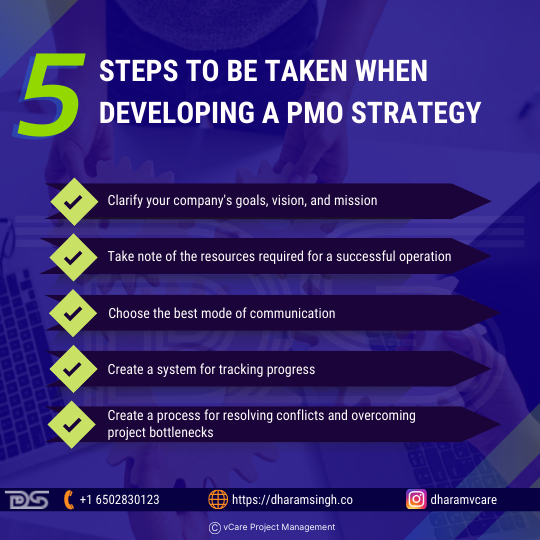
Steps to be taken when developing a PMO strategy
Situation today
In the White Paper: The Future of PMO by Aled Laugharne, Chaucer, states that:
- PMOs operating in the “traditional” way continue to meet stakeholder expectations in around 80% of cases and are considered critical to the program’s success.
- Governance, reporting, planning, and exceptions are all areas where PMOs excel.
- At present, achieving Level 2 – Foundational is sufficient to meet key stakeholder expectations. However, moving to Level 3 – Advanced increases the likelihood of PMOs being marked as “exceeding.”
- Although employers entirely staff some PMOs, consultants and contractors continue to play an important role in PMOs.
- The wider program community is typically less satisfied with PMO performance than key stakeholders who sit centrally.
- In general, there is a 50:50 split between PMOs that believe they need to prioritize improvement and those that want to maintain the status quo or have other program priorities.
Current Potential positive and negative impacts of PMO
The Covid-19 pandemic was the primary driver under External Impacts. However, the consequences of the current crisis appear destined to shape the future of PMO. The following are examples of potential positive and negative consequences:
- Cost-cutting in pandemic-affected industries has resulted in a shift in PMO resourcing to internal staff.
- Change and transformation occur due to the pandemic’s response, increasing the demand for PMO, such as in the Life Sciences industry.
- As a result of virtual working, the need for online collaboration tooling for PMOs is growing.
- With co-location in the country no longer required, virtual working increases global competition for PMO services.
- The rise of Agile PMOs is designed to respond quickly to changing external conditions.
Organizations have started looking to PMOs to optimize the management of increased projects. PMO is responsible for managing delays, cost overruns, quality, and style of the project management practices. Also, they have been involved in resource utilization and accountable for cost-overruns in the projects. It is no more just an administration or supportive role but has become pivotal in strategic and tactical operations across projects.
Today’s PMO in large organizations has an influential role to play. More than being supportive, it has become directive and controlling for compliance and alignment towards organizational objectives. In some organizations, PMOs operate at Strategic Business Unit level or Vertical in alignment with specific sectors with a key focus on Planning, Support, Monitoring, and control functions.
PMO office is involved in providing consistent templates, resources, and tools consistent across projects. Provides an integrated project management capability across the projects and facilitates collaboration in cross-department aspects to align and meet strategic business goals. The tools used and recommended by the PMO are based on Technology, Ease of adoption, price benefit, and ability to scale. Their results directly reflect upon the organization’s operational and resource challenges. Today’s PMO organization helps in who will use the tool, which will maximize benefit, impact on the PMO process, how readiness in terms of adoption, etc.,
Not to mention the problems of meeting deadlines, cost, scope, and quality. There are other areas where PMOs have to evolve; we will discuss some challenges faced by today’s PMOs.
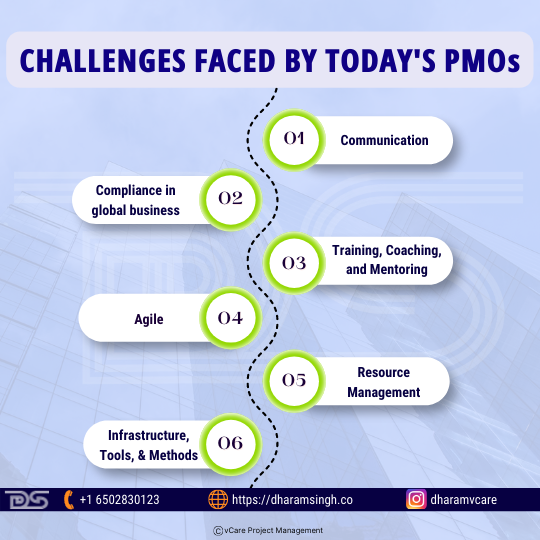
Challenges faced by today’s PMOs
Communication: As an organization has become more digital, the information required by different stakeholders and different levels requires varied contexts. Communication gaps still affect the sponsors or stakeholders due to the availability of information to act on time with the right context. As businesses are so quick to change and environment is dynamic, and priorities change frequently, the PMO must align and adapt quickly.
Compliance in global business: Organizations are no more local. Small or big organizations are starting to have global access thanks to digital. Compliance with organization standards or government regulations when operated across multiple countries. Non-Compliance could turn out to be very costly. Varied and fast changes in procedures/processes would be an additional burden in implementation. Also, cultural factors/time zones would matter when the PMO office is central and not decentralized.
Training, Coaching, and Mentoring: PMOs have to do different things apart from typical training methodologies with project managers/portfolio managers and project associates. When the domain changes, Project managers struggle to cope with these situations. PMO has to help the project manager with an appropriate strategy of training. Ability to track with leading indicators of the training rather than measuring the lagging metrics.
Agile: Large enterprises and organizations are already adopting agile. Requirements are evolving, and project managers don’t have the luxury of having absolute clarity. Yet PMO needs to help the project teams to bring clarity amidst ambiguity, managing assumptions, the definition of done, prioritization, etc. The problem-solving methods have to be made simple and deliver faster decision-making.
Resource Management: Minimizing resource waste is a key function for PMOs, and nowadays, organizations have sustainability goals that will naturally transpire to the PMOs along with project goals. Better planning and coordination are required apart from minimizing risks and managing unforeseen circumstances like COVID. For example, there was a sudden spike for Laptops for resources who are expected to work from home on projects.
Infrastructure, Tools, and Methods: PMO office teams need the right infrastructure in terms of Data, Compute, and more to process data effectively. Current PMO is empowered with tools, predominantly BI and Excel. In the given context of speed of data growth, those tools may not be sufficient. Stronger tools may be required for predictive analytics. Also, the methods are evolving, and the means to collaborate effectively must happen through effective training and other means.
The PMO is evolving into a more strategic role
PMO might focus more on canceling weaker projects. A well-planned project cancellation will free up staff for higher-priority projects. In addition, it makes sense to detect failure early and take appropriate action before the damage worsens. This action contributes to the future cultural shift required for successful project failure.
What holds the future for Tomorrow’s PMO?
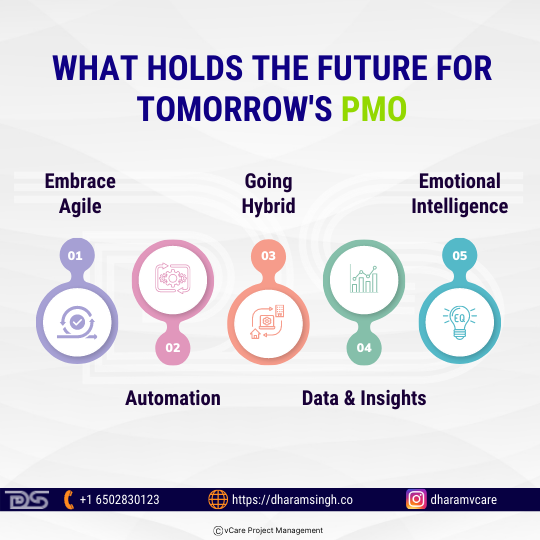
What holds the future for Tomorrow’s PMO
PMO will hold the forte of what matters for the business. They will own the projects and drive results for the organization. In a world where business and IT are more intertwined, the Role of PMO will act as a glue that bonds them together well. PMO will no longer be a support function but will be infused into the business as a core strategy. They will demand that X is needed for Y to be achieved, and this will drive the business objectives and momentum.
Embrace Agile: It has been more than 20+ years since the agile manifesto was released, and the PMO will be more flexible than ever. Organizations are adopting Agile Pods (Product Oriented Delivery) which are a group of small self-organized people with varied skills focused on bringing on the results in development. PMOs will work through this pod and manage the resource pool dynamically based on the project demands with cross-functional awareness. Adopting agile methods by PMOs will result in faster delivery timelines and a more collaborative approach to satisfy stakeholders from a 360-degree perspective. This kind of approach will create a more adaptable PMO function that can be reused and adapted as the PMO function expands its horizons.
Automation: Leverage automation to enhance the speed of delivery. PMOs must identify opportunities for improvement on routine tasks that can be automated. Focus on automating report generation and automation. We need to use the means of notification based on the criticality of the issues to the respective stakeholders. Leverage AI and bots to respond to common queries on the PMO through manual means at enterprise levels. Leveraging automation and AI would help free up critical time for the PMO office to focus on the organization’s strategic goals, act as an enabler to focus on project blockers, and help mobilize resources to resolve bottlenecks in critical paths.
Going Hybrid: By leveraging the tools which can help collaborate better, all the project-related tasks, resources, and people are brought to one place. Teams with varied skills, styles, and different views work together irrespective of place to bring more stability, engagement, and efficiency. Flexible work schedules would also help attract talent and broaden the options which are boundaryless. This freedom also allows the PMO to explore all the options in engaging or onboarding resources required for bringing good results.
Data & Insights: The ability to gain insights from the data is the trend as the data volume is moving from GB to TB. There are heterogeneous data sources beyond organizations that are more external and are to be analyzed through API and SDKs with other systems for meaningful inferences. Data getting converted information and the PMOs responsibility to forecast and identify risks with the knowledge gained through insights will be crucial for the organization. Information insights have to be obtained in less time to act upon it. Integration of communication channels and making it more flexible on push/pull gives the right balance to act upon the information.
Emotional Intelligence: Projects are made of people. People are dealt with emotions daily. Beyond cost, quality and scope, the project managers have to manage the people’s vital resources in the project with care in the times of higher attrition. Striking balance between the millennials and their expectations is crucial, which can be managed through appropriate emotional intelligence management. Managing it would result in handling pressure, making better decisions, strong relationships, and positively impacting the work environment.
Although stakeholders are generally satisfied with current PMO performance, there is a sense that PMOs will need to do the following in the coming years:
- Increase their role in strategic elements of a program, transformation, or organization while decreasing the time spent on transactional processing.
- Increase your tooling and automation, which will allow you to de-scale and facilitate remote working in the “new normal.”
- Organize themselves to quickly “spin up” to support transformations and change the PMO approach as needed.
- Play a bigger role in fusing the “traditional” PMO approach with Agile working methods.
- When establishing and changing the PMO approach, prioritize stakeholder engagement, especially for the larger stakeholder community, and plan specific change activities.
Evolution of PMO – Today & Tomorrow
The PMO’s role might keep changing, but the concept of bridging the gap between today and future PMOs is learning from failures.
- PMOs lose sight of the strategy and become mired in tactical or administrative tasks.
- PMOs maintain a project portfolio that contains gaps, overlaps, and other waste.
- PMOs add processes rather than simplifying or eliminating them.
- PMOs believe that tools will solve all of their problems – or that the flashiest tools will solve all of their problems.
- Even when they provide value, PMOs fail to communicate it.
- PMOs waste too much time on meaningless – or bad – reporting.
- PMOs do not track what is essential or hold people accountable.
- PMOs do not optimize or provide transparency into resource utilization.
- PMOs behave more like police officers than aid workers.
- PMOs either cannot find their place in an agile world or resist it.
As per PMI research, more than 55 percent of PMO directors say the charter for their PMO has changed in the past five years as the impact of technology on PMO is dynamic. The PMO, as part of the organization, is affected by this disruption without exception.
Some examples of the technology used in PMO and its impacts:
- Cloud – 66%
- Digitalization – 54%
- Artificial Intelligence (AI) – 25%
- Internet of Things (IoT) – 24%
- Blockchain – 11%
Conclusion
Transformational PMO needs to learn quickly and must embrace digital disruption. The experts in the domain of PMO have to implement their tools wisely. A new generation of PMOs will be strategic enablers, bridging the gap between a company’s vision and how that vision comes to life. Future PMOs could be virtual or Hybrid. If you are setting up your PMO today, consider all the technical and digital options available on the cloud to use it best. These options would help manage Strategic, Tactical, and operational levels. Include that in your budget. This budgeting would also bring on Collaboration and Transparency. The high use of PPM-Portfolio/Program Management Tools would be crucial for larger organizations. PMO is no more an organization of assigning tasks and monitoring them; it’s well beyond boundaries.
Feel free to check out my discussion on this topic with Thomas Walenta in YouTube.
You can subscribe and follow my podcasts and interviews with Project Management Experts on YouTube at https://bit.ly/2NDY8wd
You can subscribe to vCare Project Management YouTube Channel to catch future videos of our certification Q&A series and student success stories using the link https://bit.ly/2YF0wJl
For any questions related to Project Management career, training, and certifications, you can book an obligation free 15 minutes session with me by visiting talktodharam.com

by DharamCW | Nov 6, 2020 | General
Agile (.adj) means “to move quickly and easily”. It is a mindset of being more responsive. Humans are born agile. Off late, agile has been highly adopted by the software industry, but, in reality, it has been adopted by organizations of different domains to bring on success.
Agile Manifesto, created by seventeen software developers in 2001, embraces four core values: individual interactions over process and tools; working software rather than through documentation; collaboration with customers; and responding to change rather than following a plan.
Agile mindset is not only about that, but it would have those four principles as a foundation for a successful agile transformation bringing on agility in the organization. This transformation would certainly change the way organizations handle their portfolio, programs and projects. Steve Denning, an authority on Agile management, argues that hardware developers need to embrace Agile principles to keep up with the pace of innovation.
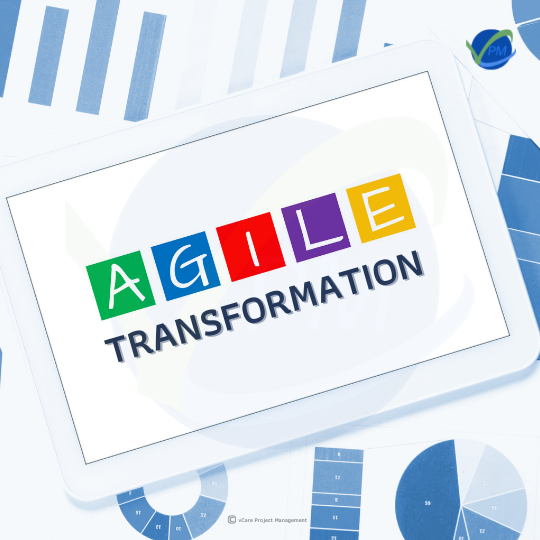
Agile Transformation
Tesla creates a lot of 3D Models and continuously iterates them to create many models to test them in different ways rapidly. 3D Printing techniques have empowered Tesla to pursue this methodology.
With this capability, rapid changes in hardware component level are iterated until the best design is evolved. SpaceX also exhibits a similar continuous iteration. Continuously improving and managing to incorporate customer feedback is all about having an agile mindset. The agile mindset is more of the management and leadership problem, which needs a cultural shift of thinking in an agile way.
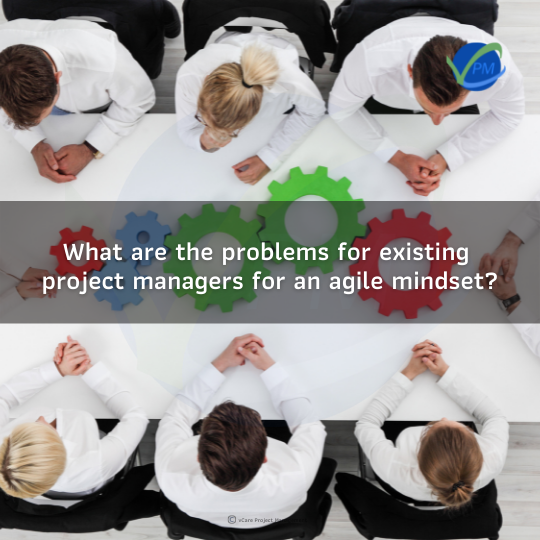
Problems for existing project managers
What are the problems for existing project managers for an agile mindset?
- Typically, project managers assume that Agile is another project management approach.
- Ability to unlearn and learn to avoid the lens of project management previously done.
- Lack of familiarity with Agile concepts (e.g., Self-Organizing Teams)
- Confusion between the agile principles and frameworks such as Scrum, XP, etc.,
- Undermining the benefits of agile and not having trust in those principles
Agile Mindset
When we talk about the agile mindset, I would like to share with you all the below Zen Ex Machina diagram from Ahmed Sidkey’s “Agile mindset” presentation done in Agile Alliance conference 2014. The agile mindset reflects upon the actions and behaviors, thereby creating an agile culture. These can be brought to action based on 4 Values, 12 Principles as outlined in the diagram here.
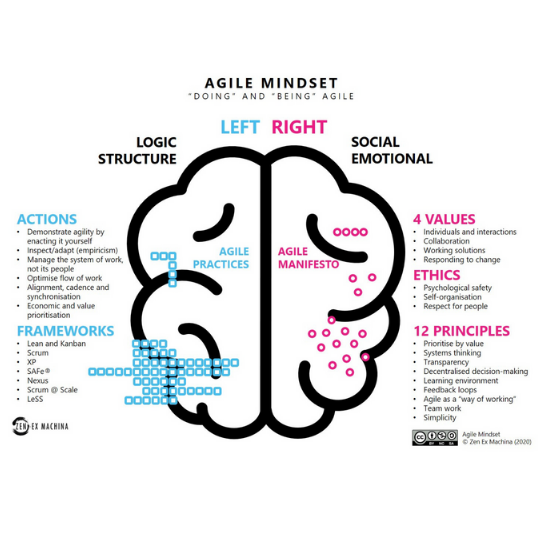
Agile Mindset
Agile mindset is all about exhibiting certain behaviors. In an organization, we need to respect the worth of every person. Always exhibit truthfulness in communication by being transparent on the data, actions and decisions made. Commit to the team and organization through the collaboration for the common goal, trusting that support will be available from each other.
The following table outlines the differences in terms of agile vs. fixed mindset.
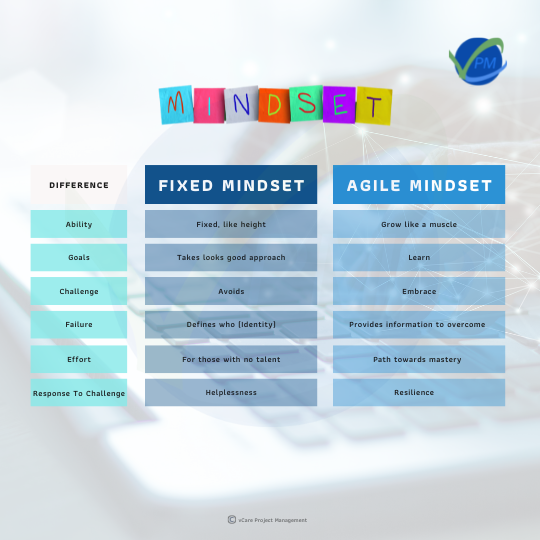
Fixed Mindset vs. Agile Mindset
When you are working on portfolio/programs/projects, you don’t see all the necessary outcomes, but you keep evolving it. Typically, when we are talking about an agile mindset, it always keeps evolving. This evolution can be referred to IKIWISI – I know it when I see it. So, when you can show the progress, customers or stakeholders can relate it better and conceive better.
It’s important to have an agile mindset, to “be agile,” but you also need to have the requisite skills to “do agile” and the experience to do “enterprise agile.” Though we understand the benefits and tenets of the agile mindset, when it comes to implementation, there is a lack of guidance for the team on what to adopt and how to go about the same. Typically, when teams follow a prescriptive framework, things fall in line and provide better results. It provides a better improvement which is consistent over time. One such prescriptive framework for adopting agile practices is DAD (Disciplined Agile Delivery) framework.
How DAD (Disciplined Agile Delivery) can be leveraged for mindset?
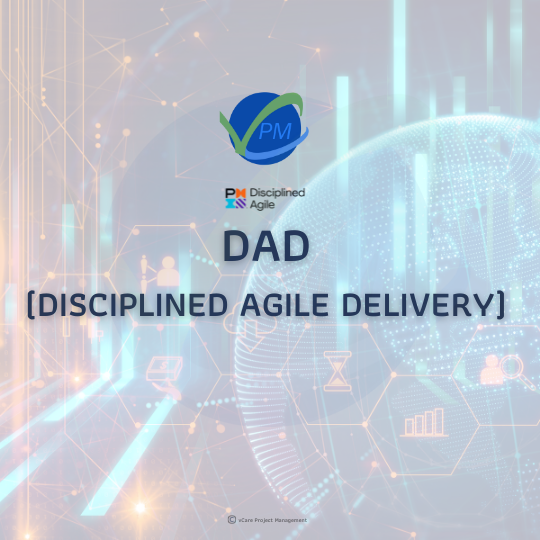
DAD
DAD approaches agile as a people-first, learning-oriented methodology for delivery. PMI DAD Toolkit is free for use. The focus of the toolkit is on the delivery, which is achieved by being hybrid which can take the best across multiple methodologies. The agile mindset can be accomplished by leveraging the Disciplined Agile mindset recommendation from PMI, which encompasses PPG (Principles, Promises and Guidance). DAD can help us transform ourselves into an agile mindset in practice. Easier said than done, but DAD could be the guiding light toward it.
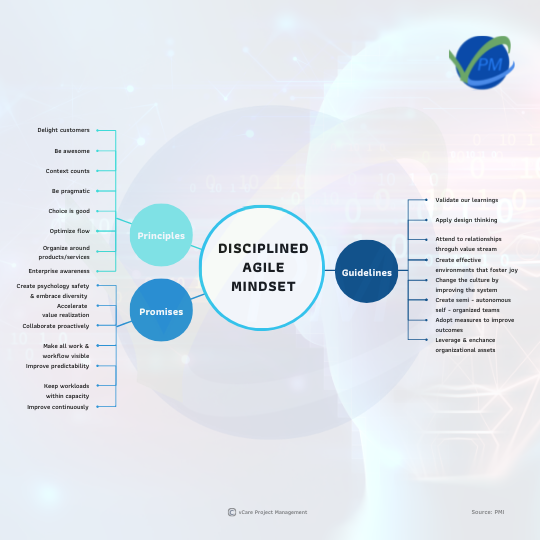
Disciplined Agile Mindset
For having and improving the agile mindset, the locus of control needs to be more internal. The focus on outcomes and giving the necessary empowerment to people makes a significant difference. It should be embracing rather than imposition to people or one’s self. Disciplined Agile provides guardrails, guidance and enterprise awareness so your life as PM would be easy to advocate and embrace. DAD’s toolkit helps an organization to adopt common vocabulary while adoption of agile becomes easier with principles such as Delighting the customers, Optimizing the flow, etc.,
The following are some of the philosophies which could help the portfolio to be managed better based on DAD’s toolkit:
The motivation of resources:
There could be projects wherein there is a need for reduction in resources, some places it might cause cost overrun. Have the portfolio resources spread across the projects and rotate them across projects based on interests. Having a stable team who have good knowledge and understanding of domain can be cross-trained easily as well. Enable the team by building a safe culture and environment, and by motivating them to excel.
Business Value:
In this pandemic time, the customer would also suffer. There is no other good time than now to support them. One of the key portfolio strategies would be to maximize the stakeholder value by minimizing the risk in building the whole thing. So, approach such as “Prove Architecture Early” by building architecture components earlier would help achieve balance in risk profile and provide better value. This move helps the team to arrive at consensus early and re-prioritize activities after discussing with the customer.
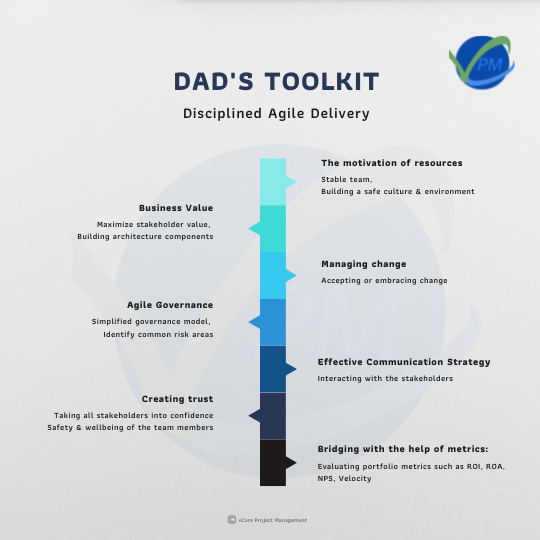
DAD’s Toolkit
Managing change:
With an agile mindset, fundamental thinking is accepting or embracing the fact that change is natural. A change could be influenced by a situation like a pandemic, technology changes, political factor, economic and legislative changes, and many more reasons. This change needs to be managed by Managing work items, prioritizing who has to work on it with details on How? and What?. Use of tools like Kanban boards can be very handy here.
Agile Governance:
- Incorporate simplified governance model across the portfolio and programs.
- Identify common risk areas and try to revisit the vision on what is to be accomplished.
- Relook strategies where the PMO efforts can be focused on creating business value for the stakeholders.
Alignment of the portfolio strategy with enterprise strategy would help to bring the stakeholders on the same page as well.
Effective Communication Strategy:
Interacting with the stakeholders is a very important component in seamless, agile implementation. The right choices of the communication channel based on the given context are very influential and can make a big difference.
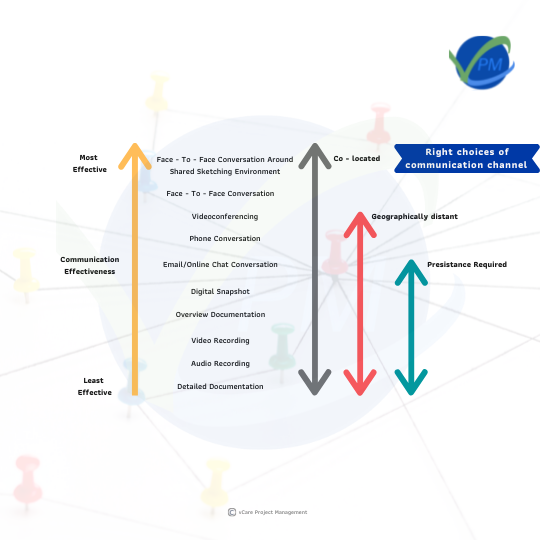
Right choices of the communication channel
Creating trust:
- Ensure the safety and well being of the team members.
- Take smaller initiatives which can lower the risk and enable frequent deliveries, thereby creating a trust of both the customer, teams and vendors.
- Act on action items after taking all stakeholders into confidence, which would create trust, resulting in a long-term relationship and also would enable us to maneuver key initiatives smoothly across the portfolio.
Bridging with the help of metrics:
Look at the gaps in the portfolio due to the current situation by evaluating portfolio metrics such as ROI, ROA, NPS, Velocity, etc., This would help on how to embrace the change and why that change is to be made. Manage the portfolio better by interacting with other teams based on the metrics.
Conclusion:
Overall this article aims to impart the essential aspects of the Agile Mindset. It highlights some key ingredients which can be applied during the current pandemic times to improve the situation better from Agile Context.
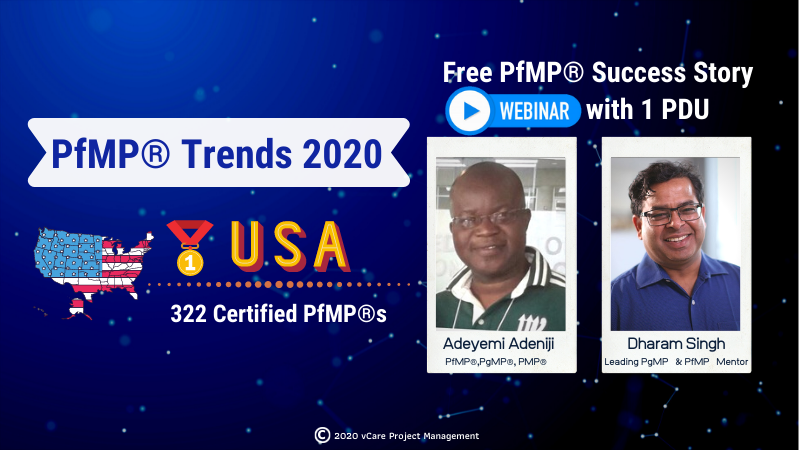
by DharamCW | Mar 27, 2020 | How many PgMP | How many PfMP
True that the coronavirus has impacted the global population on a large scale with many losses happening across business lines. Governments and People are showing resilience to the challenge that nature has thrown upon us. Humanity has bounced back from far great miseries in its history, and I am sure we will overcome this too in the coming weeks.
Once again, history repeats itself: the recent outbreak of coronavirus has caused a significant impact on the big corporate powerhouses and the daily life of ordinary citizens. Humanity has bounced back from far great miseries in its history, and I am sure we will overcome this too in the coming weeks. The plans made by the government and resilience shown by the citizens instill courage for a better future.
Meanwhile, amidst all this duress, Mother Nature is as such that it will continue to do its work of surprising us in its way. Some professionals are also similar to Mother Nature in that manner. Aspirants of PfMP® have amazed me with their large numbers and success over the past three months. In this period between Dec 23, 2019, to Mar 16, 2020, a total of 32 professionals have successfully cleared their PfMP® certification exams. Congratulations to all the 32 professionals.
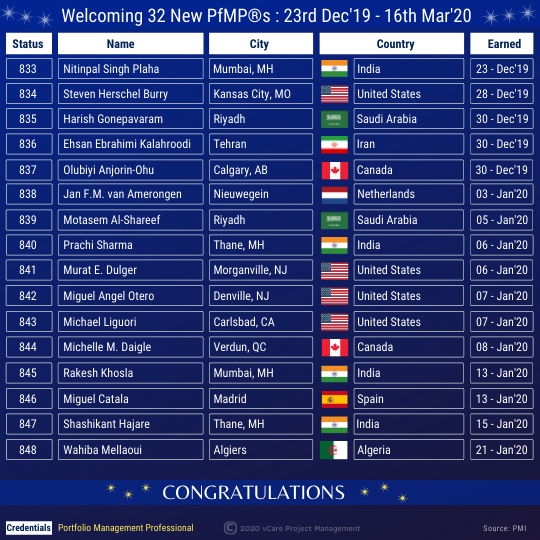
Welcoming 32 New PfMP®s
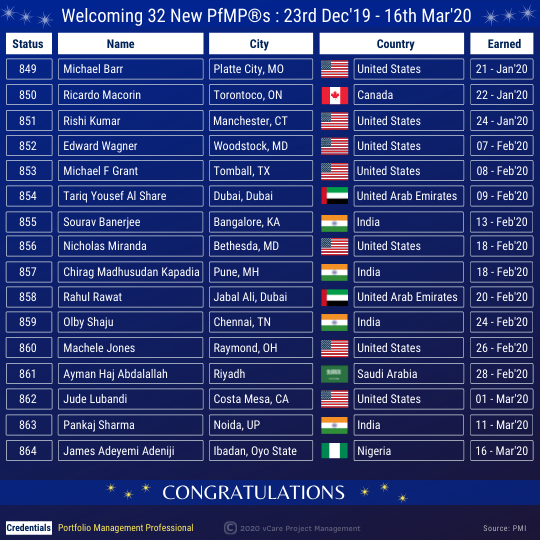
Welcoming 32 New PfMP®s

Global PfMP® Stats
This number is a great achievement, considering the times we are in. Of the 32 professionals who have passed the exam in this period, I am delighted to announce that two of them have taken the assistance of vCare Project Management to support their certification journey. Special thanks to Yemi Adeniji (Group Mentoring Program) and Rakesh Khosla (Application Support) for trusting my guidance.
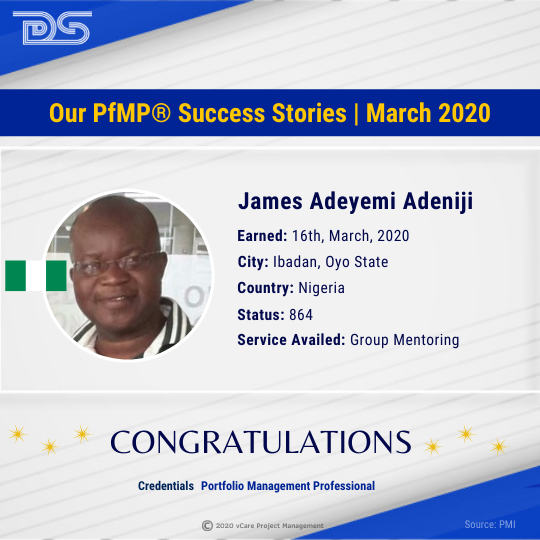
PfMP® Success Stories
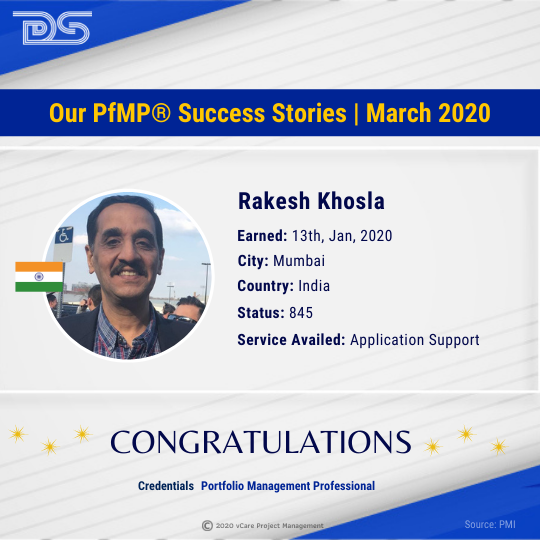
PfMP® Success Stories
PfMP® Stats

Global PfMP® Stats
- The USA continues to maintain its top position with 322 PfMP®’s
- India is fast catching up on Canada and is threatening its second position with just only one count separating them

Latest PfMP® Stats
- The African continent has 17 PfMP®’s thus far of which South Africa and Nigeria hold 5 and 4 PfMP®’s respectively
- Saudi has a total of 59 PfMP®s now, where 8 PfMP®s have been benefitted from our guidance which is 14% of the total global PfMP®s in Saudi Arabia.
vCare Project Management is the most trusted training provider with a 100% success rate in PfMP® certification. It helps you to gain the skills and knowledge required to pass your PfMP® certification in the first attempt with an above-target score.
PfMP® Success Story Free Webinar with Yemi Adeniji – Earn 1 PDU
As I revealed in my earlier article, I am keeping myself occupied with a lot of online/virtual training programs of PgMP® and PfMP® over the past few weeks, along with making multiple video sessions with Project management experts and documenting of certification success stories. Just last week, I had completed a session with Ahmad Hassan, from the USA on his recent PgMP® success. To watch that webinar, click here.
With immense pleasure, Yemi Adeniji has agreed to share his PfMP® success story with us. I invite everyone to attend this free webinar on Apr 05, 2020.
Webinar Time: 1:00 PM – 2:00 PM (PST) / 9:00 PM – 10:00 PM (BST) / 9:00 PM – 10:00 PM (WAT) / 11:00 PM – 12:00 AM (AST)
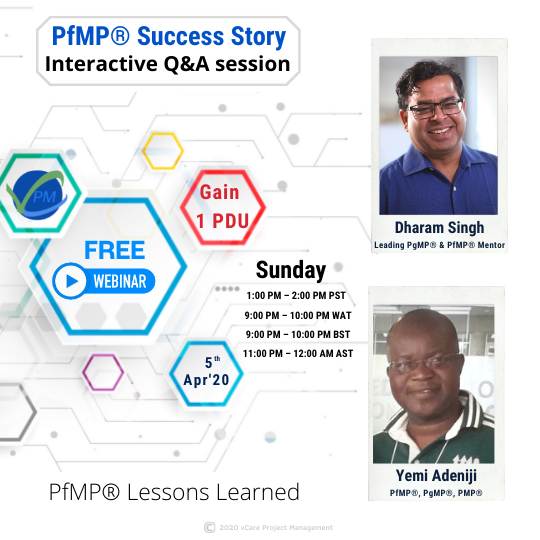
PfMP® Success Stories
In this webinar, Yemi will share his insights on,
- Essentials that one needs to cover for PfMP® preparation. His Eligibility check, the Application process, hurdles encountered, and essential tips that enabled him to pass the exam in the first attempt.
- What was his motivation to pursue PMP®-PgMP®-PfMP®? Why should one pursue all the three as you have done so?
- How would this PfMP® aid him in his work right now? How had PMP® and PgMP® had helped him in the past?
- What is the value that PMI certifications such as PMP®, PgMP® and PfMP® hold in the professional space in Africa, especially in Nigeria?
- How his certifications benefit his work in the Government sector?
- How his certifications have benefitted his work in Transportation domain?
- Other challenges in Industry
- His advice to PgMP® and PfMP® aspirants
Aspirants can learn from Yemi’s experience and insights to not only sharpen their certification preparations but also to fine-tune their career plans. I will also share my tips to prepare and pass the PgMP® exam in your first attempt. You can watch this free webinar at your comfort and gain 1 PDU as an added benefit.
You can join this webinar by registering using the below Link,
Webinar Link : https://bit.ly/2JlQPqF
Because of the hardships that the companies and professionals are going through currently, I have decided to offer multiple discounts and flexible payment options to these programs. Stated offers will be decided on a case by case basis and to know your eligibility, reach out to me in a personal message or kindly mail to info@vcareprojectmanagement.com. Please share this information with your friends who would find it useful.
- 3 Days Virtual Program (Standard 9 AM – 5 PM) with a couple of breaks in between
- 5 Days Virtual Program (5*4 hours/session) Half a Day programs
- 4 Weeks – 12 Weeks Weekend only Virtual Program (1 – 4 hours per day, either Saturday or Sunday or Both)
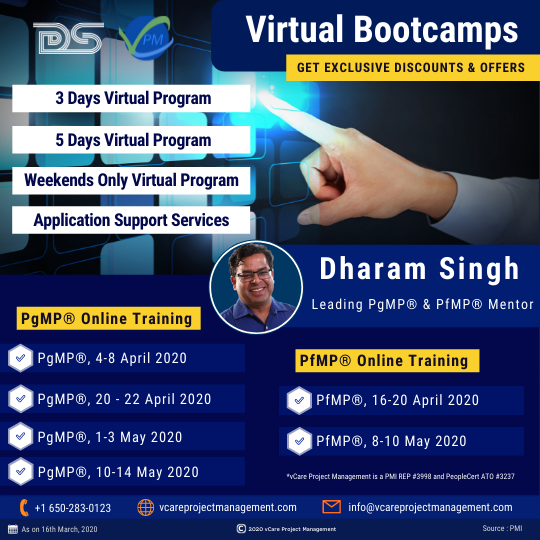
Virtual Bootcamps
Following are the program links,
PgMP®, 4-8 April 2020 – http://bit.ly/2QacgPd
PfMP®, 16-20 April 2020 – http://bit.ly/33hDeKj
PgMP®, 20 – 22 April 2020 – http://bit.ly/2Wc3GU0
PgMP®, 1-3 May 2020 – http://bit.ly/3aVakC6
PfMP®, 8-10 May 2020 – http://bit.ly/2QeHG7d
PgMP®, 10-14 May 2020 – http://bit.ly/2TWCN3C
Prince2® starting from March 29, 2020 (10 Weeks Weekend Program) – http://bit.ly/2vRu8ry
PMP® starting from March 29, 2020 (12 Weeks Weekend Program) – http://bit.ly/3aQr7X0
View all our Online Self E-Learning Programs: http://bit.ly/3b2HOid
You can supplement your PgMP® exam preparation using our PgMP4U mobile app.

PgMP4U
If Newton can create wonders working from home, then you can too, http://bit.ly/2Qls2XA.
PgMP4U LinkedIn Group: http://bit.ly/2SBPwIp
PfMP4U LinkedIn Group: http://bit.ly/31P7GKR
Subscribe and follow my Podcasts on http://bit.ly/2RMvsTv
For any questions related to Project Management training and certifications, you can book an obligation free 15 minutes session with me by visiting talktodharam.com
For the latest PgMP® stats, visit http://bit.ly/38lL5HG.
“Working together for success.”
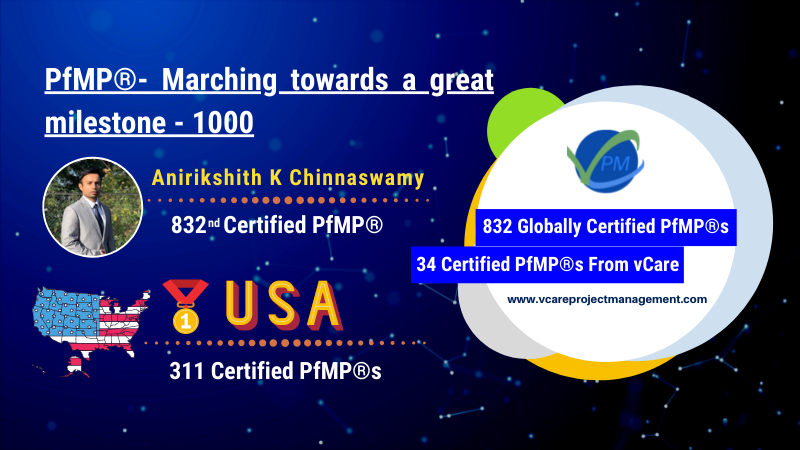
by DharamCW | Dec 30, 2019 | How many PgMP | How many PfMP
PfMP® is moving at a great pace. The milestone of 1000 is getting closer, and we are eventually about to witness the 1000th PfMP® in the mid of 2020. Between 17 Nov 2019 and 22 Dec 2019, a total of 18 PfMP®s has passed the exam.
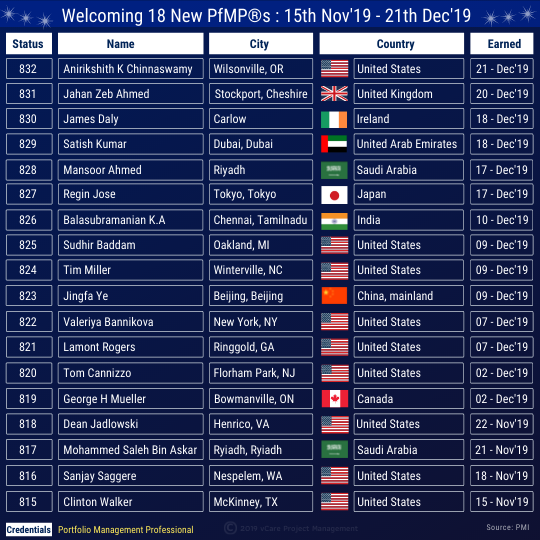
Welcoming 18 New PfMP®s
Among those 18, vCare Project Management is proud to have supported two PfMP®s to become certified. Thanks to Anirikshith K Chinnaswamy and Tim Miller for trusting our guidance.
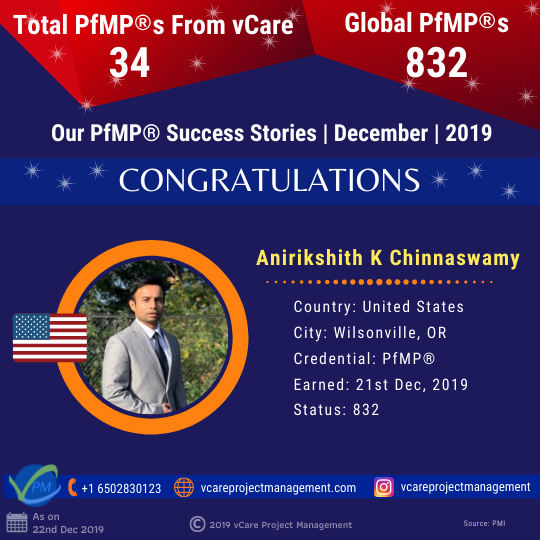
Our PfMP® Success Stories
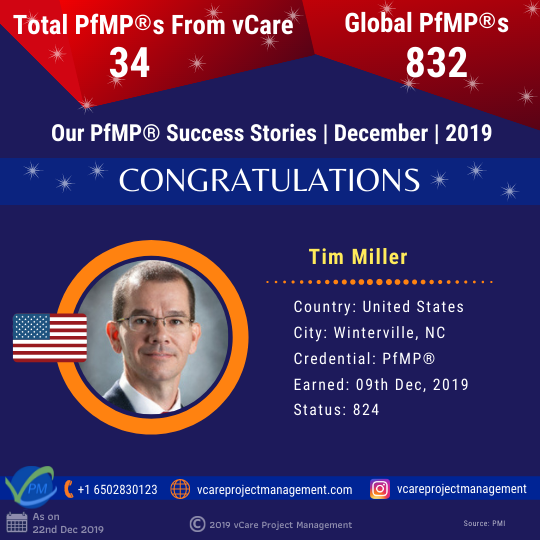
Our PfMP® Success Stories
PfMP® is a globally recognized certification awarded to professionals who prove themselves capable of managing complex situations in a portfolio of an organization. PfMP® allows you to promote yourself in your organization. PfMP® is an industry neutral certification establishes your capability to manage a portfolio of projects and makes you a target for the most lucrative top-level jobs in any industry.
vCare Project Management is the most trusted training provider with a 100% success rate in PfMP® certification. It helps you to gain the skills and knowledge required to pass your PfMP® certification in the first attempt with an above-target score.
PfMP® stats
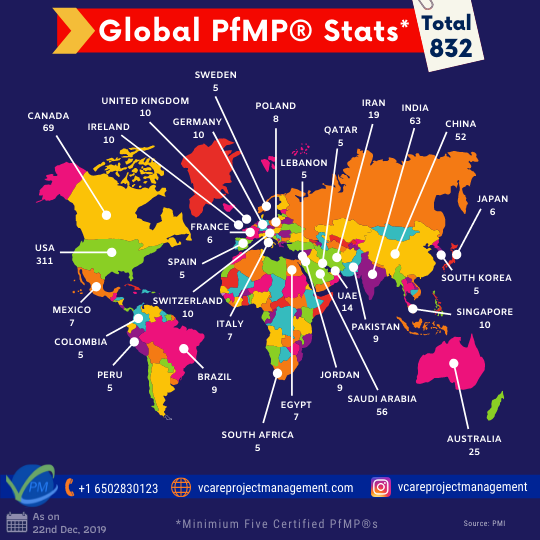
Global PfMP® Stats
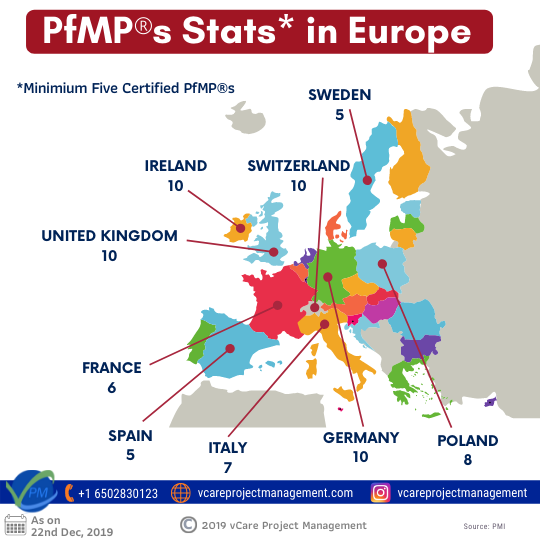
PfMP® Stats in Europe
- The USA has been strengthened with eight new PfMP®s and maintains its top position.
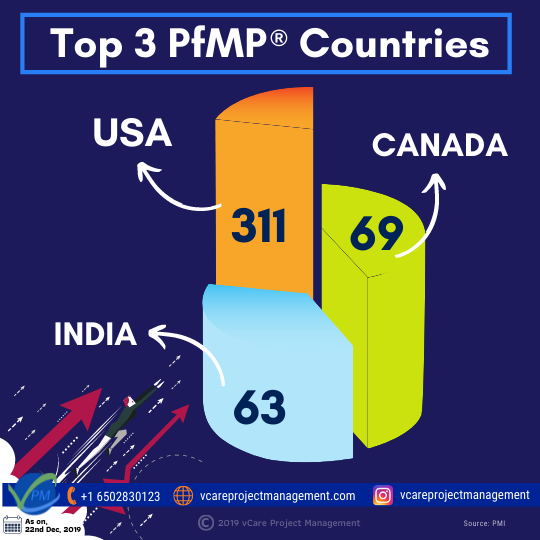
Top 3 PfMP® Countries
- Canada and India have produced 1 PfMP® each and stay in their 2nd and 3rd position, respectively.
- Saudi has a total of 56 PfMP®s where 8 PfMP®s have been benefitted from our guidance which is 14% of the total global PfMP®s in Saudi Arabia.
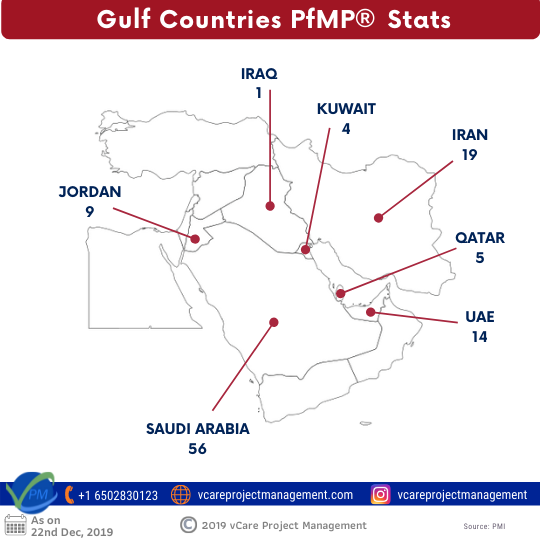
Gulf Countries PfMP® Stats
- Australia is in the 6th position with 25 PfMP®s. Out of the 25 PfMP®s, vCare Project Management has supported the success of 12 PfMP®s which is 48% of the total PfMP®s from Australia.
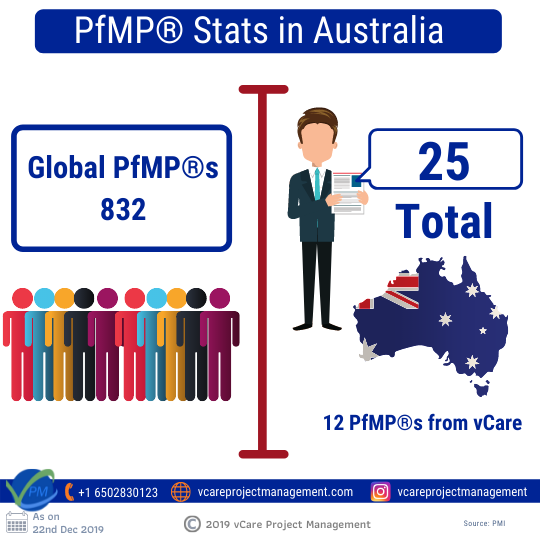
PfMP® Stats in Australia
2019 has been an excellent year for PfMP®s in comparison with the yesteryears. In 2019 itself (As on 22 Dec 2019), a total of 186 professionals have achieved this prestigious certification. That’s a very encouraging number for any PfMP® aspirant.
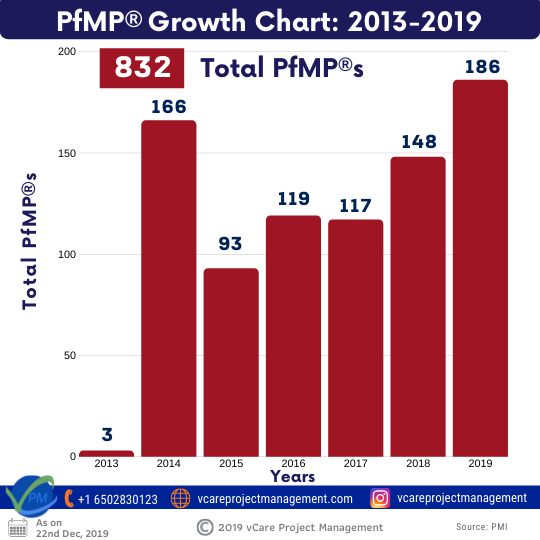
PfMP® Growth Chart
Global PfMP®s count has now reached 832. We are likely to witness the 1000th PfMP® in the mid of 2020. Happy that we’ve contributed to the success of 34 PfMP®s globally and expecting to see more in the coming months.
We have announced 4 PfMP® programs to kick start the new year.

Training Calendar
This will be an excellent opportunity to present yourself as one among the prestigious 1000 PfMP®s. To know more about these programs, you can visit https://vcareprojectmanagement.com/collections/pfmp-classroom/PfMP.
For more queries and clarifications, you can book an obligation free 15 minutes session by clicking talktodharam.com
You can visit our YouTube Channel for all past and future webinar recordings of PgMP® and PfMP® success stories. Every month, we are adding 2-3 sessions. If you subscribe, you can get the notification for every new session.
You can also join our PfMP4U Whatsapp group. It is an active group where discussions on PfMP® exam preparation are brought to light daily.
You can also reach me for any guidance at +1 650 283 0123
Check Out our Online Mentoring Programs,
Program Management PgMP®- Online Mentoring Programs – Click Here
Portfolio Management PfMP®- Online Mentoring Programs – Click Here
Project Management PMP®- Online Mentoring Programs – Click Here
Working together for Success…
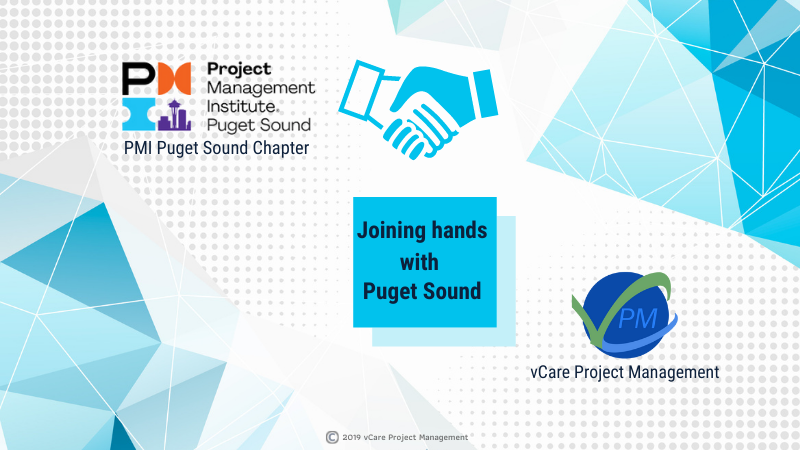
by DharamCW | Dec 6, 2019 | General
It is my immense pleasure to announce that vCare Project Management and PMI Puget Sound Chapter has formed a synergy for helping aspirants of PgMP®, PMI-RMP®, PMI-PBA®, and PMI-SP®.
The PMI Puget Sound Chapter was established in 1984 and is one of the largest Chapters in the United States. Its vision is to increase the awareness, effectiveness and value of professional project management for practitioners and organizations. In alignment with their mission of advancing the project management profession, they have opted to ally with vCare Project Management.
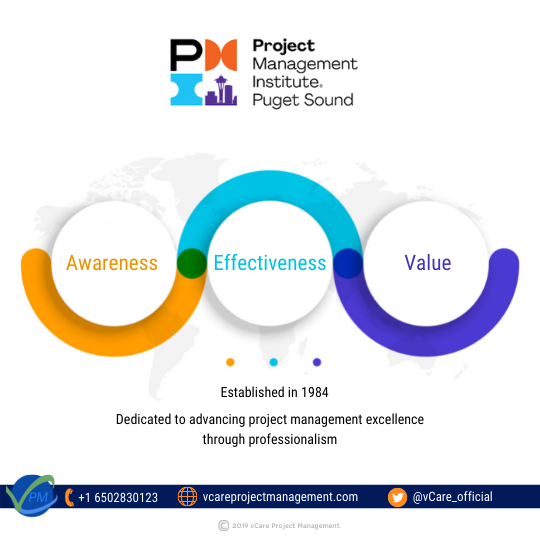
project management excellence
Since its inception in 2011, vCare Project Management has been providing training, consulting, advisory, resourcing services in project-program-portfolio management space. Our specialized training programs meet requirements of PMP®, PgMP®, PfMP®, RMP®, ACP®, SP®, PBA®, Prince2®, ITIL® and SAFe® aspirants. Our offerings also include customized training programs to meet organizational requirements. We are a global R.E.P (Registered Education Provider) of PMI and were the first to get R.E.P status based on PgMP®.
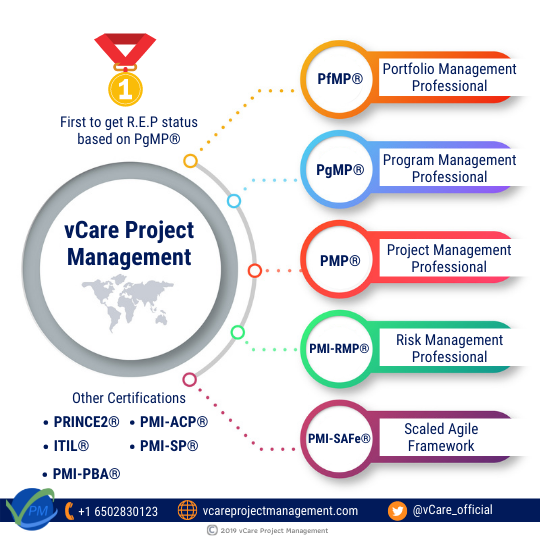
vCare Project Management
Our collaboration with PMI Chapters began in Australia with the PMI Sydney Chapter in October 2014. Since then we have allied with other PMI Chapters in the region including PMI New Zealand Chapter from November 2014, PMI Melbourne Chapter from February 2015, PMI Adelaide Chapter from January 2016 and PMI Queensland Chapter from October 2016 in supporting their project management training requirements. We are also proud sponsors of the PMI Australia Conference since 2016.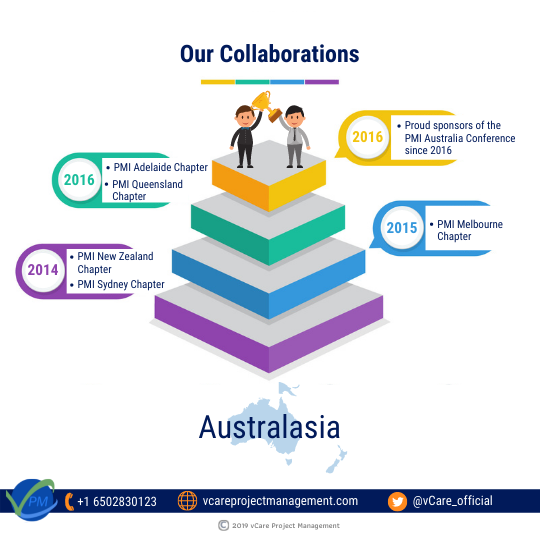 Our Collaborations
Our Collaborations
We have also collaborated with the PMI North India Chapter, PMI Hyderabad Chapter, PMI Singapore Chapter and PMI Dubai Chapter.
With the beginning of 2019, vCare Project Management decided to serve directly from the USA to meet the increasing training requirements of professionals from this region. Our initial collaborations were with the PMI San Francisco Bay Area Chapter and PMI Nashville Chapter on May 2019, and now our partnership has extended to PMI Puget Sound (Seattle) Chapter from November 2019.
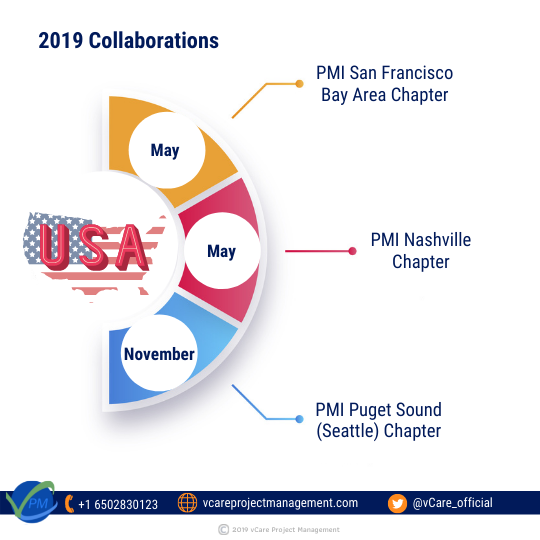
2019 Collaborations
My Special thanks to Ronald Tschech, VP of Education, PMI Puget Sound Chapter for facilitating this collaboration with vCare Project Management. PMI Puget Sound Chapter members enjoy a strong network of support in project management through education and volunteerism. In addition, such a Chapter Membership saves money on PMI certification events and exams conducted in association with the Chapter.
First of our planned training programs is the PgMP® boot camp that occurs on February 21-23, 2020. Ronald Tschech, VP of Education, PMI Puget Sound Chapter is the event organizer and Bala Dodoye-Alali, Lead Director of Professional Development, PMI Puget Sound Chapter, will be the event lead. Early-bird registration for the program closes on January 15, 2020, and final registration closes on February 18, 2020.
To know more about the Program, visit :
http://bit.ly/2PeWS2W (Chapter Link, Geo-restricted) or http://bit.ly/2Lqt0iW
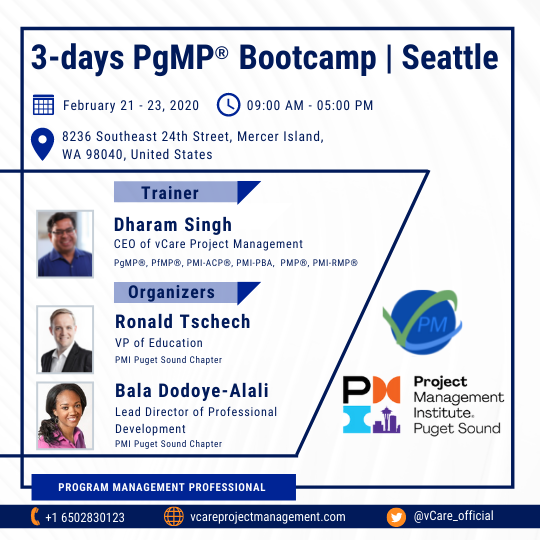
PgMP® Bootcamp
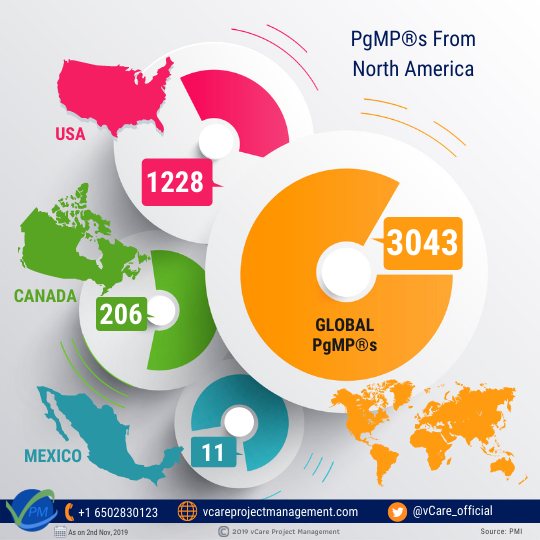
PgMP®s From North America
We have also planned for events covering other certifications such as PfMP®, PMI-RMP®, PMI-PBA® and PMI-SP® within the next year. Will keep you people posted on those.
We are hoping to pass on the value of vCare Project Management to all the professionals attending the programs and expecting a great success in this collaboration with the PMI Puget Sound chapter.
We look forward to collaboration possibilities to meet the training, consulting, advisory, resourcing requirements in the project-program-portfolio management space. We are currently in talks with many PMI chapters and Organizations for a mutually beneficial partnership. Stay tuned for updates.
Are you preparing for PgMP®? You might be working as a Project Manager, but can be eligible for PgMP®? Let us talk and find out how I can make your PgMP® / PfMP® journey easy and fun. Please book 15-min obligation-free appointment with me by visiting talktodharam.com
You can visit our YouTube Channel for all past and future webinar recordings of PgMP® and PfMP®. Every month, we are adding 2-3 sessions. If you subscribe, you can get the notification for every new session.
Join PgMP4U Telegram group for free and enjoy the daily discussions on PgMP® exam preparation. This group has about 365 members, and it is a very active group. If you are interested in this group, please download the Telegram Messenger and send me a message.
Our PgMP4U App is ready to be downloaded on Android phones. Sorry, the iPhone version is coming soon. You will find this app most comprehensive, and it will assist you in preparing for your exam.
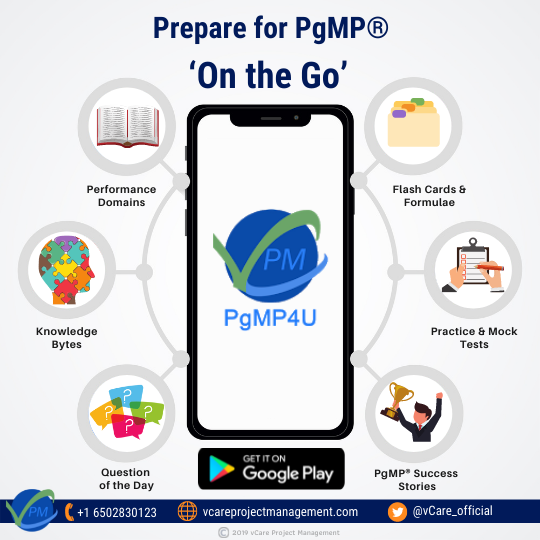
PgMP4U
Check Out our Online Mentoring Programs,
Program Management PgMP®- Online Mentoring Programs – Click Here
Portfolio Management PfMP®- Online Mentoring Programs – Click Here
Project Management PMP®- Online Mentoring Programs – Click Here
If you have any questions related to Project Management training and certifications, please book your 15 mins free obligation session by visiting talktodharam.com
Please feel free to call me or message me at +1 6502830123
Email: dharam@vcareprojectmanagement.com
“Working together for SUCCESS.”









































 Our Collaborations
Our Collaborations



Recent Comments